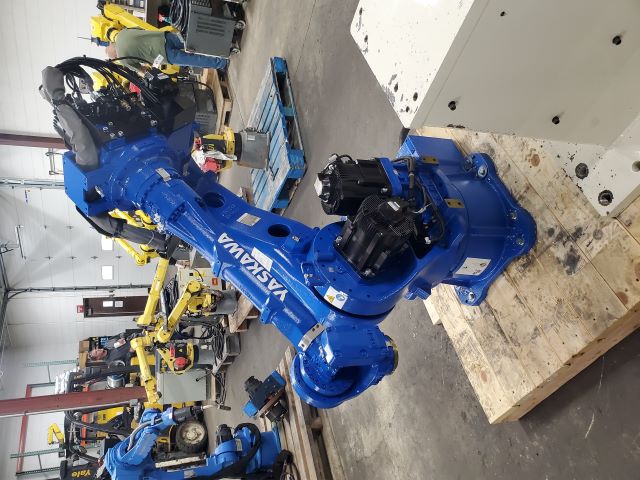Advantages of Using Industrial Robots in Manufacturing

The use of industrial robots in manufacturing is growing rapidly. The Yaskawa MH50 and the FANUC M-20ia along with other industrial robot arms are freeing factory workers from repetitive, dull, and dangerous jobs while creating more efficient production processes for manufacturers. The many advantages of robotic automation provide several reasons why manufacturers regardless of size should consider implementing industrial robots.
- 1. Lower Costs - Lowering costs is often the number one cited advantage of robotic automation. Replacing manual labor with the ABB IRB 2600 will obviously lower labor costs. However, robotic automation will also result in lower material and utility costs.
- 2. Faster Cycle Times - Cycle times will become faster and consistent with the FANUC Lr Mate 200id and other robot manipulators. Robots operate at fast and consistent rates. Bottlenecks are eliminated allowing productions to run smoothly and continuously. Unlike with workers, manufacturing robot arms never become distracted or tired, keeping manufacturing on track.
- 3. Higher Productivity - With faster cycle times more parts can be processed in less time resulting in higher productivity. Factory robots allow manufacturers to be able to keep up with high demand. Robotic automation also gives manufacturers the ability to scale up operations without having to bring in extra equipment or hire additional personnel.
- 4. Better Quality - Robotic automation will improve product quality. Articulated robots operate with extreme accuracy. They are programmed to follow specific application paths without deviation, mitigating the chance of any errors from occurring. With human workers errors are common resulting in inconsistent and poor product quality.
- 5. More Sophisticated Products - With industrial robotic arms manufacturers can build more sophisticated products. Industrial robots expand manufacturing capabilities allowing companies to design and successfully manufacture products that would be too complex or intricate for human workers.
- 6. Faster Lead Times - Robotic automation can help keep all aspects of a manufacturing operation in-house. The elimination of outsourcing and the productivity gains of robotic automation result in faster lead times for better customer retention.
- 7. Reduced Environmental Footprint - Using the Yaskawa GP50 and other six axis robots allows for cleaner manufacturing. Robots are energy efficient, reduce waste, and lower VOC emissions. Manufacturers can lower their environmental footprint with robotic manipulators.
- 8. Reliable Labor - Today’s manufacturers have been plagued by high worker turnover and labor shortages. These issues can cause significant disruptions to productions. Automating with robots provides reliable labor. Robots can operate 24/7 without breaks. There are no days off or unexpected labor shortages with robots.
- 9. Ability to Adapt - When changes to manufacturing arise, handling robots have the ability to adapt unlike other forms of manufacturing equipment. They can be reprogrammed and retasked for the ability to automate multiple projects throughout their lifetime.
- 10. Gain Competitive Edge - Robotic automation allows products to be produced at faster rates with less cost involved. Companies can offer their products at more affordable prices, gaining an edge over the competition.
- 11. Optimization of Floorspace - Industrial robots allow manufacturers to optimize floorspace with various mounting options or with compact workcells. They can also operate in tight spaces, allowing manufacturers to make the most of their floorspace.
- 12. Safer Environment - Replacing workers with robots creates a safer work environment. Factory accidents and injuries are reduced as robots automate dangerous jobs.
Robots Done Right is the place to start when it comes to used robots. Contact us if you are interested in buying or selling a used robot.